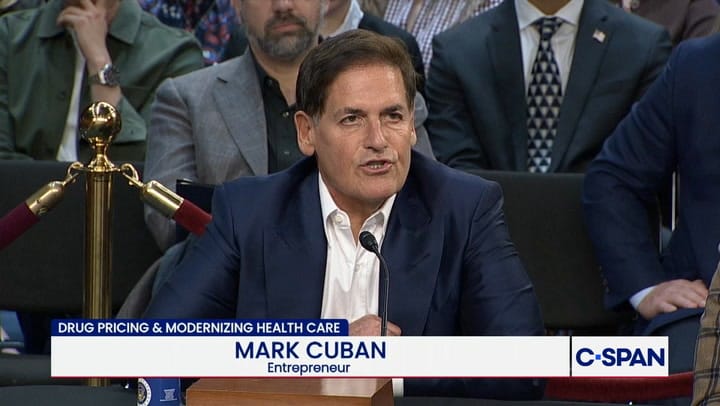Mark Cuban’s Four Fixes That Could Actually Save Healthcare

Last week, Mark Cuban appeared before the Senate Aging Committee to talk about modernizing healthcare and lowering drug costs.
It was a hearing, but it felt more like a clinic — a masterclass in how incentives, monopolies, and middlemen have quietly hijacked one of the most essential systems in America.

If you’ve been reading Drugstore Cowboy for a while, you know the villains by now: the Pharmacy Benefit Managers (PBMs). They’re the invisible gatekeepers who decide which drugs your insurance covers, how much you pay, and how much your local pharmacy gets reimbursed.
They’re the reason your inhaler costs $500 out of pocket while my pharmacy loses money dispensing it.
In my piece WTF Is a PBM???, I compared them to the Mafia — they skim off every transaction, they make the rules, and they dare you to question the math.
Cuban used more Senate-appropriate language, but his description was just as damning. I encourage all of you to watch the first five minutes and thirty seconds of this clip to hear his opening statement — the clearest, most digestible breakdown of what’s wrong with American healthcare I’ve ever heard.
That’s the whole scam. Beautifully put.
But instead of just describing the problem, Cuban did something almost no one in Washington ever does — he gave four concrete, achievable fixes.
Today, I want to break those down, explain why they matter, and show how — if adopted — they could unwind decades of dysfunction that have destroyed independent pharmacy, inflated drug prices, and hollowed out public trust in medicine.
This is how we rebuild the system the right way.

1. Count All Cash Payments Towards Deductibles
If you’ve ever filled a prescription and your pharmacist says, “It’s actually cheaper to pay cash,” you’ve already encountered one of the absurdities of our system.
Sometimes an insurance copay has to bake in fees and rebates to pay the PBM processing the transaction.
Sometimes the PBM is punishing the patient for using a local pharmacy instead of one it owns — like Accredo, the mail-order pharmacy owned by Express Scripts.
And sometimes, the PBM is trying to steer you toward a drug they get a better spread on, so they quietly bump up the price as a deterrent.
While that’s inherently a scummy practice, it should be avoidable. Patients should have the freedom to choose the best-priced option without being punished for it.
But this is the drug mafia — so of course that’s not how it works.
Yes, patients can pay the cheaper cash price if they want to save money. But there’s a catch: that payment doesn’t count towards their insurance deductible.
PBMs designed it that way — punishing patients who shop around so they stay trapped in the inflated, rebate-driven network. Any delay in reaching a deductible essentially renders insurance useless. You end up paying full list price for doing the rational thing: comparing prices.
Cuban’s first fix would end that. It’s one of those ideas that sounds almost too simple to matter — until you realize how much power it takes back from PBMs.
What It Means: Every dollar you spend on your medication — whether through Cost Plus, a local pharmacy, or an online cash deal — would count towards your deductible, whether you use insurance or not.
No more punishing patients for being price-conscious. No more forcing people to choose between saving money now or meeting a threshold later.
Why It Matters: This one rule would restore basic competition.
If insurers had to credit cash purchases, they’d finally have to compete with transparent prices instead of hiding behind formularies and contracts.
And independent pharmacies could negotiate directly with patients again — not through a faceless PBM portal.
Imagine a world where patients could fill anywhere and still get credit for it.
That’s freedom of pharmacy choice — the same kind of freedom PBMs have been quietly eroding for twenty years.

2. Base Out-of-Pocket Costs on “Net” Price, Not “List” Price
This one sounds technical, but it’s the beating heart of the problem.
Every drug in America has two prices: the list price and the net price.
The list price is the sticker — an inflated number drug companies set so they can pay PBMs enormous rebates in exchange for formulary placement.
The net price is what’s left after those secret rebates are paid. It’s the real cost.
Right now, patients pay their coinsurance based on the list price, even though PBMs and insurers reimburse based on the net price. It’s a number that only matters because PBMs exist.
We’ve seen proof of that through the recent Pharm-to-Table movement. If you come to my pharmacy, C.O. Bigelow, and buy a one-month supply of Zepbound, it’ll cost over $1,000 — because that’s what I pay a wholesaler.
But if you buy it DTC from LillyDirect without insurance, it’s $350. My pharmacy isn’t allowed to pay that price, because when the drug flows through wholesalers and PBMs, the pricing must account for their cut of the spread.
The PBM collects rebates on that inflated number. The insurer gets a cut. The patient pays the difference.
Cuban’s second fix would outlaw this shell game. Out-of-pocket costs would be calculated on the true net price, not the markup used to feed the rebate machine.
The entire PBM model depends on inflationary pricing.
Kill the spread, and you kill the incentive to keep list prices sky-high.
What It Means: Patients would pay for drugs based on what PBMs and insurers actually pay after rebates — not the fictional sticker price.
Why It Matters: It realigns incentives overnight. PBMs could no longer profit from inflated prices. Drug companies could lower prices without fear of losing formulary access.
And pharmacies could finally get reimbursed fairly, instead of being the only party in the chain forced to sell below cost.
“List price” is a fiction. PBMs are the writers.

3. Separate Formularies From PBMs
This is the one that makes every PBM executive sweat — and in my opinion, it’s the most important fix.
A formulary is the list of drugs your insurance will cover. PBMs claim they design formularies to promote safety and cost-effectiveness.
In reality, they sell placement to the highest bidder.
Manufacturers compete not by lowering prices, but by raising them — making room for “rebates” that look a lot like bribes. It’s pay-to-play medicine, and patients lose every time.
Cuban’s third fix would strip PBMs of that control and move formulary management to independent, transparent entities — guided by clinical data, not kickbacks.
Separating formularies from PBMs is how we return prescribing to the people who actually understand medicine — doctors, pharmacists, and scientists.
What It Means: Formulary decisions would be handled by neutral, evidence-based panels or transparent third parties. PBMs could still process claims, but they couldn’t dictate which drugs make the cut.
Why It Matters: It ends the perverse incentive that rewards complexity over care. PBMs would no longer be able to auction off their formulary placements and patient access to the manufacturers offering the highest kickbacks.
Right now, PBMs make more money the more confusing the system is.
Transparency would make that impossible.
As I wrote in The Monopoly Hiding in Plain Sight, PBMs have turned “vertical integration” into a monopoly that would be illegal in any other industry.
They own the insurer, the PBM, the mail-order pharmacy, and even the data.
The people deciding which drugs Americans can access don’t wear white coats.
They wear suits.

4. End Specialty Tiers
If you’ve ever seen the term “specialty tier” on your insurance card, you probably already know what it means: higher cost-sharing for the sickest patients.
Drugs for cancer, multiple sclerosis, HIV, and autoimmune diseases are labeled “specialty” not because they’re rare — but because they’re expensive, and PBMs can charge more for them.
Patients often pay 25–50% coinsurance, even when the drug is the only viable option.
And most of the time, you’re forced to fill those prescriptions at a “specialty pharmacy,” where the only thing special is that it’s owned by the PBM.
Cuban’s fourth fix is simple: end specialty tiers altogether. Treat all prescriptions equally when it comes to coverage and cost sharing.
What It Means: Insurance plans could no longer carve out high-cost drugs into higher co-pay brackets. Everyone would pay consistent, predictable rates.
Why It Matters: Fairness and simplicity.
We don’t need actuarial gymnastics to decide who deserves medicine.
We need a system that doesn’t make people sicker just because they got unlucky.
At C.O. Bigelow, I see patients every week who could get their meds faster and cheaper locally — but their plan forbids it.
The sickest people in America are effectively being fined for the crime of being expensive to treat.

The Bigger Picture
Every week, readers email me some version of the same question:
“Okay, Alec — you’ve convinced me the system is broken. What can we do about it?”
Here’s your answer. Start with these four steps.
They don’t require a revolution or a trillion-dollar bill.
They just require aligning incentives with common sense.
Let patients use their money efficiently.
Make prices reflect reality.
Stop letting monopolies pick the winners.
Stop punishing the sick.
If those sound obvious, that’s the point. Complexity is the PBMs’ camouflage.
The way out isn’t complicated — it’s just transparency.
Publish the price. Show the math. Let the market work again.
That’s how you rebuild trust at scale.
And to be clear, none of this means the system becomes perfect overnight.
There will still be politics, lobbying, and loopholes.
But these ideas would start to unwind the stranglehold that’s made every prescription in America feel like a ransom.

The Final Dose
When I started Drugstore Cowboy, my goal was simple: to show people what it really looks like under the hood of this machine.
Most of the time, my stories are about loss — of margin, of trust, of independence.
This week, for once, I get to write about something that actually looks like hope.
Mark Cuban doesn’t need this fight. He could have stayed in his lane, spent his time chasing another NBA title, and never learned what “spread pricing” means.
But he did the work. He learned the acronyms. And now he’s using his platform to say what pharmacists, doctors, and patients have been screaming for years.
We may not be in business together, but we’re aligned on the thing that matters most: the belief that transparency is the only cure strong enough to fix a system this sick.
So the next time someone asks what can be done, send them this piece — or better yet, send them Mark Cuban’s testimony.
Because for once, the solutions aren’t hidden in the fine print.
They’re right there, in four lines, waiting for someone in Washington to read them out loud — and actually mean it.
Giddy up.

Alec Wade Ginsberg, PharmD, RPh
4th-Gen Pharmacist | Owner & COO, C.O. Bigelow
Founder, Drugstore Cowboy
